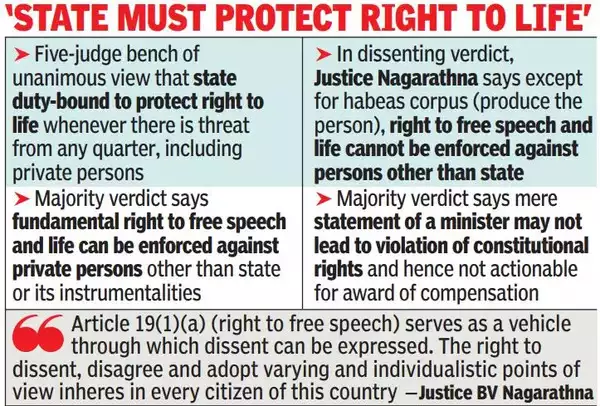Ahmedabad
(Head Office)Address : 506, 3rd EYE THREE (III), Opp. Induben Khakhrawala, Girish Cold Drink Cross Road, CG Road, Navrangpura, Ahmedabad, 380009.
Mobile : 8469231587 / 9586028957
Telephone : 079-40098991
E-mail: dics.upsc@gmail.com

Freedom of Speech of Ministers
News: Recently, a Constitution Bench of the Supreme Court unanimously and rightly ruled out any additional curbs on free speech by ministers.
Background:
• The case (Kaushal Kishor v the State of UP), relates to the Bulandshahar rape incident of 2016, in which the then Minister of the State termed the incident a ‘political conspiracy and nothing else’.
• A writ petition was filed by the survivors before the SC and the court raised an important question: “Can restrictions be imposed on a public functionary's freedom of speech and expression?”.
What was the Majority Judgement?
• Like other citizens, ministers are guaranteed the right to freedom of expression under Article 19(1) (a), governed by the reasonable restrictions laid out in Article 19(2) — and those are enough. Because “The role of the court is to protect fundamental rights limited by lawful restrictions and not to protect restrictions and make the rights residual privileges.”
• The majority ruling also made a valid distinction on the government’s vicarious responsibility for ill-judged or hateful remarks made by its individual ministers. The flow of stream in collective responsibility is from the Council of Ministers to the individual ministers. The flow is not on the reverse, namely from the individual ministers to the Council of Ministers. It is not possible to extend the concept of collective responsibility to “any and every statement orally made by a Minister outside the House of the People/Legislative Assembly”.
• The court also addressed the question of whether the statement of a minister, that is inconsistent with the fundamental rights of citizens, can result in a constitutional tort. A mere statement by a minister that goes against an individual’s fundamental rights may not be actionable, but becomes actionable if it results in actual harm or loss.
What was the dissenting judgement?
• The minority judgment expresses concern over a hateful public discourse - “hate speech, whatever its content, denies people dignity”.
• It is possible to attribute vicarious responsibility to the government if a minister’s view represents that of the government and is related to the affairs of the state. If such a statement is not consistent with the view of the Government, then it is attributable to the Minister personally.
• It holds the view that there should be a proper legal framework to define acts and omissions that amount to ‘constitutional tort’.
Way Forward
• There are enough provisions in the statute book to deal with speech that promotes enmity and violence or results in cramping the freedoms of others.

Address : 506, 3rd EYE THREE (III), Opp. Induben Khakhrawala, Girish Cold Drink Cross Road, CG Road, Navrangpura, Ahmedabad, 380009.
Mobile : 8469231587 / 9586028957
Telephone : 079-40098991
E-mail: dics.upsc@gmail.com
Address: A-306, The Landmark, Urjanagar-1, Opp. Spicy Street, Kudasan – Por Road, Kudasan, Gandhinagar – 382421
Mobile : 9723832444 / 9723932444
E-mail: dics.gnagar@gmail.com
Address: 2nd Floor, 9 Shivali Society, L&T Circle, opp. Ratri Bazar, Karelibaugh, Vadodara, 390018
Mobile : 9725692037 / 9725692054
E-mail: dics.vadodara@gmail.com
Address: 403, Raj Victoria, Opp. Pal Walkway, Near Galaxy Circle, Pal, Surat-394510
Mobile : 8401031583 / 8401031587
E-mail: dics.surat@gmail.com
Address: 303,305 K 158 Complex Above Magson, Sindhubhavan Road Ahmedabad-380059
Mobile : 9974751177 / 8469231587
E-mail: dicssbr@gmail.com
Address: 57/17, 2nd Floor, Old Rajinder Nagar Market, Bada Bazaar Marg, Delhi-60
Mobile : 9104830862 / 9104830865
E-mail: dics.newdelhi@gmail.com